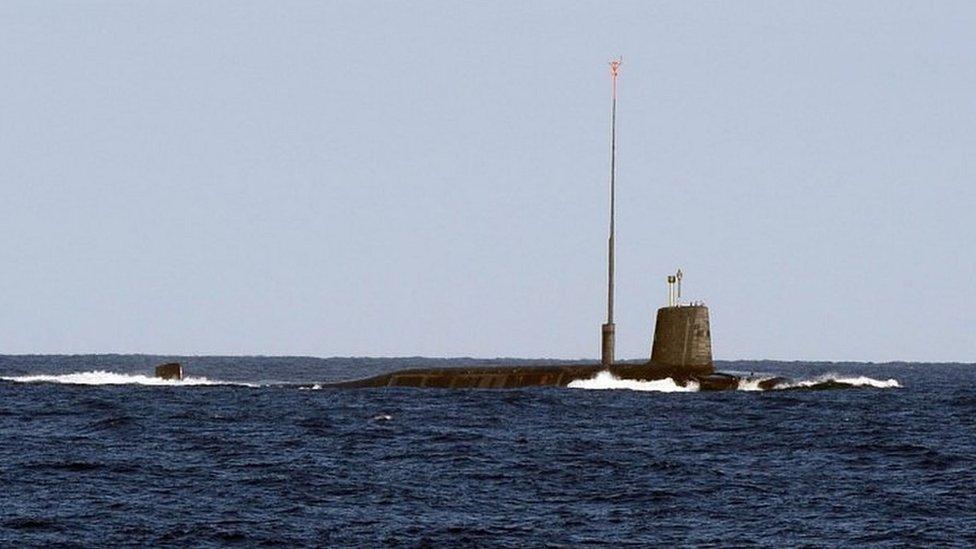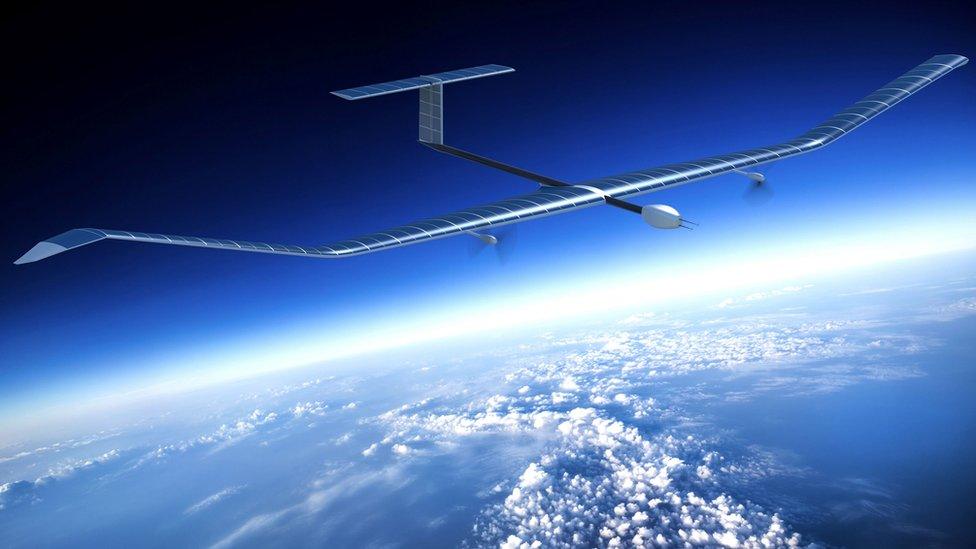UK pledges greater use of Artificial Intelligence to repel military threats
- Published

Greater use will be made of artificial intelligence and other new technologies to combat emerging global threats, the defence secretary has said.
A £160m fund will be set up to support new military capabilities to tackle space and cyber-threats.
Gavin Williamson said artificial intelligence had a growing role to play in protecting the UK's submarine fleet.
But Labour said no new money had been earmarked to deal with the "affordability crisis" in procurement.
In a statement to MPs on the Modernising Defence Programme, a £1.8bn initiative begun in January to strengthen the armed forces, Mr Williamson said there would be increased focus on cutting-edge technologies to enable the UK to keep pace with competitors and adversaries.
But he said this would not be at the expense of conventional land, air and sea power, as he insisted there were no plans to cut the UK's armoury of warships, submarines, armoured vehicles, helicopters and jets.
BBC defence correspondent Jonathan Beale said the programme shed light on how the UK would respond to future threats but that "big questions" remained about defence spending.
Labour says government estimates suggest a funding shortfall of between £7bn and £15bn against planned equipment spending over the next decade.
The Ministry of Defence plans to invest heavily in warships, jets and armoured vehicles.
What are the emerging threats?
"The character of warfare is fundamentally changing," declares a report on the modernisation programme, which flags up rising levels of "overt and covert state aggression" across Asia, Eastern Europe and the Middle East.
"Cyber-attacks, assassination, disinformation, theft of intellectual property, espionage and military intimidation are all being used more regularly and more ruthlessly," it says.
It highlights "reckless and indiscriminate" cyber attacks by Russia's military intelligence service, against not just international institutions but "business, media and people going about their daily lives".
Technological advances have "drastically increased" the speed at which attacks can unfold, the report says.
"Areas such as artificial intelligence, autonomy, directed energy weapons (such as lasers) and warheads that can manoeuvre at hypersonic speeds provide new challenges and opportunities."

The solar-powerd Zephyr "high-altitude pseudo-satellite" - shown here in an illustration - is highlighted in the report as an example of innovative British engineering in surveillance
So how can UK defences adapt?
Mr Williamson said AI would be integrated into new programmes as the UK strove to harness its "world-leading array of capabilities" as effectively as possible.
In particular, new "Spearhead" programmes would seek to apply modern technologies to sub-surface submarine threats, surveillance and reconnaissance capabilities, and command and control in land operations.
"Our adversaries and competitors are accelerating the development of new capabilities and strategies," he said.
"We must keep pace and conceive our joint force as consisting of five domains - air, land, sea, cyber and space - rather than the traditional three."
Mr Williamson said spending on defence was increasing in real terms every year and the total budget would rise to £40bn by 2021.

A wasted opportunity?
Analysis by Jonathan Beale, BBC defence correspondent
Gavin Williamson's Modernising Defence Programme has been a long time coming. It's taken over almost a year to complete.
The defence secretary had argued that he should take control of the review in order to avoid being forced to make more painful defence cuts. He's already persuaded the Treasury to give the Ministry of Defence (MoD) an additional £1.8bn.
He's also set out his plans to modernise the armed forces - with extra investment in new technologies such as combating cyber warfare and developing robots for the battlefield using artificial intelligence. But he still hasn't shown how he'll do all this with the money he's been given.
Critics say he's avoided difficult decisions. The MoD still has a funding gap of at least £7bn in its ambitious equipment programme to buy new warships, jets and armoured vehicles. Labour says this review does nothing to solve the affordability crises facing his department.
Mr Williamson still hopes he can persuade the Treasury to give him more cash in next year's spending review. But that might be tough post-Brexit with many other competing demands. Even one senior source inside government described this review as a "wasted opportunity" for serious reform.

Can the nation afford it?
Shadow defence secretary Nia Griffith said the Ministry of Defence's own figures showed the funding gap in its defence equipment plan for the next decade could be as high as £15bn.
She said Mr Williamson had to be honest about what programmes would be "deferred, de-scoped or deleted".
"Either the government must come forward with enough additional funds to fill this gap, something the secretary of state has completely failed to do," she said.
"Or he must be honest about the difficult choices that have to be made."
In a recent report, the National Audit Office said 40% of the MoD's budget would be allocated to equipment over the next 10 years and the plans as they stood were unaffordable.